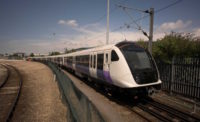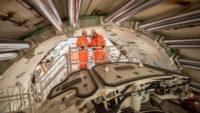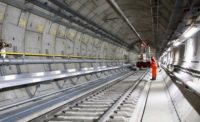Even before construction starts, the U.K.’s new high-speed railroad between London and Leeds, England, via Birmingham and Manchester, has undergone a 40% budget increase and two-to-five-year schedule extension, according to an assessment by Allan Cook, chair of the project company HS2 Ltd.
Revealing the new numbers on Sept. 3, British Secretary of State for Transport Grant Shapps said work on the project would continue until a separate review ordered by the government last month concludes.
Cook told the government that the cost would likely reach $86.5 billion to 93.7 billion rather than the current budget of $67 billion, all at 2015 values.
At today’s prices the cost hike would total 41%, to $106 billion.
Cook also predicted that finishing the first phase, 230 km between London and Birmingham, could be delayed from 2026 to the 2028-31 time frame.
The former Atkins chairman said in his 58-page report that project pricing and schedule estimates did not fully consider ground conditions were "significantly more challenging than predicted.
He added that project funding projections in 2015 "were based on initial client estimates derived from desktop drawings ... and without the benefit of any investigation of ground conditions or similar levels of detail across all areas of scope," but acknowledged that they were “based on the best available estimates at the time."
His assessment comes at a time when contractors are working to establish budget estimates for the phase-one main construction packages.
Under seven main contracts valued at $7.9 billion that were awarded by HS2 Ltd. in July 2017, joint ventures were expected to complete detail design and set costs within a year, with construction starting this year.
While preparatory work continues, the government tasked former HS2 Ltd. Chairman Doug Oakervee to complete a review of the project this fall.
HS2’s second phase, to Manchester and Leeds, has yet to be fully planned.
"HS2 is the single largest project of this government. One important aspect of the panel’s work is to consider whether both the costs, and the benefits, of the scheme have been correctly identified," said Shapps. "The current budget was established in 2013 and later adjusted to 2015 prices. Since that time, significant concerns have been raised."
He added: "I want the House to have the full picture. There is no future in obscuring the true costs of a large infrastructure project – as well as the potential benefits."





Post a comment to this article
Report Abusive Comment